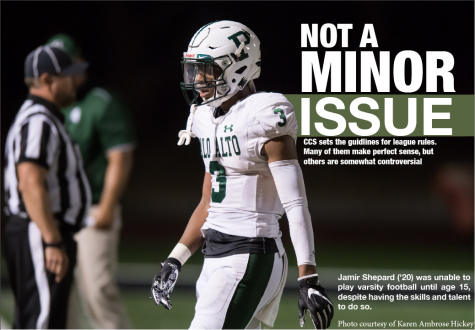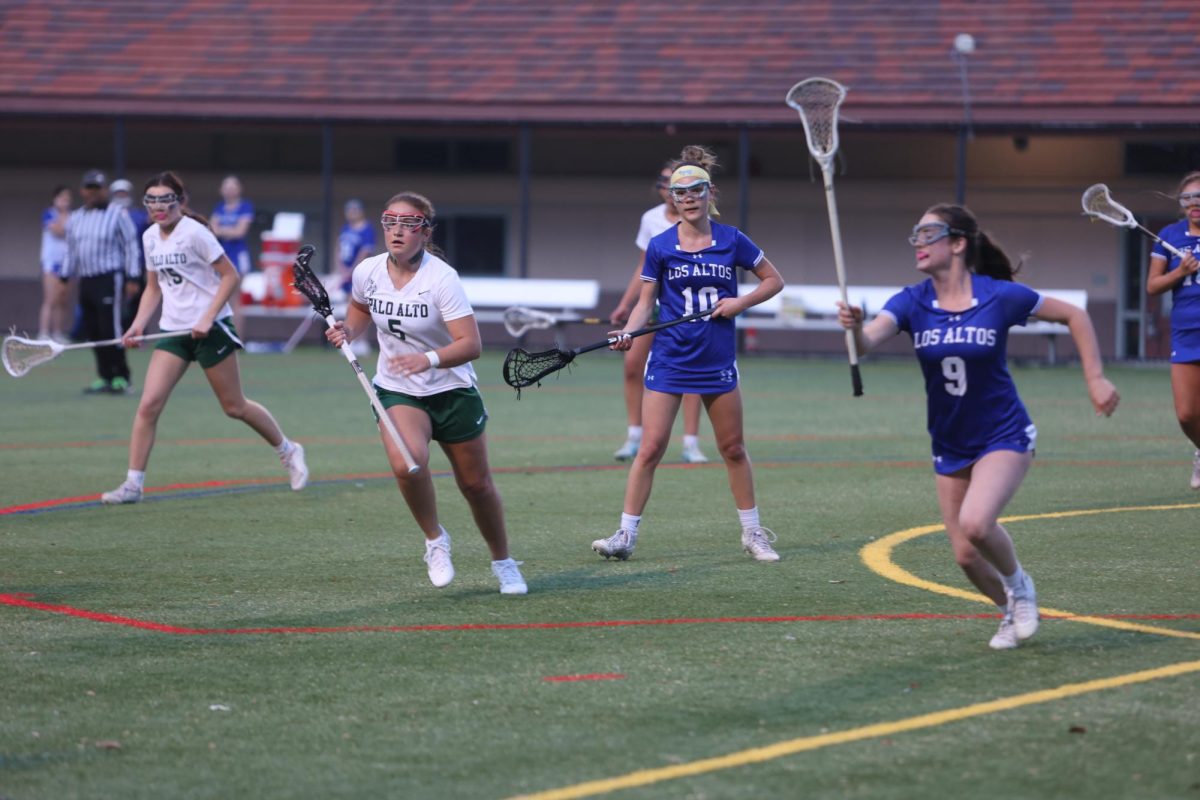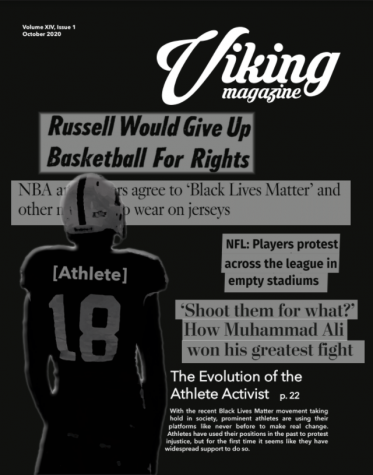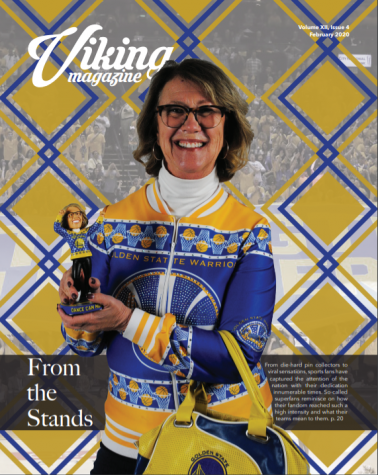Not A Minor Issue
January 9, 2018
 As Jamir Shepard (‘20) comes down with his 2nd touchdown of the game against Milpitas High School, he knows even with his superior performance he will have to wait until he’s 15 to play varsity football.
As Jamir Shepard (‘20) comes down with his 2nd touchdown of the game against Milpitas High School, he knows even with his superior performance he will have to wait until he’s 15 to play varsity football.
Many student-athletes have to deal with the rules and regulations of the Central Coast Section, better known as CCS. There are some rules that cause them to miss games, while there are other rules that prevent players from really “getting into the game”.
Specifically, the CCS has an age requirement to compete at the varsity football level. Article 190 – Football, Section 1900 Age Requirement, states, “A student under 15 years of age may not participate in an interscholastic contest or scrimmage against the varsity team of another school.”
However, there is one exception: if the player is at least 14 years of age, has a letter from their doctor, consent from their parents, a statement from the varsity coach about their physical and mental maturity, and a statement of compliance sent by the principal to a Section Office for verification, then the requirement can be waived.
The process stated above is one that requires a lot to be done and many coaches and principals may not want to comply.
One student-athlete that was affected by this rule was Shepard, who was denied the chance to move up to varsity due to his age.
“Since I was 14 at the start of the season, I wasn’t able to move up to varsity until my 15th birthday,” Shepard said. “I think that if you’re good enough to play varsity, you should be allowed to play at any age.”
Once Shepard turned 15 and was pulled up to varsity, he instantly became a starter. Even though he was just a freshman with little varsity experience, he acted as one of the team’s standout players.
In the CCS Football Bylaws, it is not clear why this rule even exists. Although these rules are implemented throughout the whole section, the CCS may have these to prevent injuries.
“This rule probably exists because CCS is trying to protect the players. They don’t want really young 14-year olds to go up against athletes who are 16 or 17,” Shepard continued. “I think CCS thinks that the players might be really small, height and weight wise. But if they were too small to play, they wouldn’t move up”
The Paly varsity football coach, Danny Sullivan, offers a different point of view regarding the rule.
“It’s a rule across the state, not the section only. It’s pretty straightforward, you have to be 15 years old,” Sullivan said. “We are not going to be bring a kid up to varsity unless we have permission from parents or grandparents, whoever is the legal guardian.”
Although Shepard is not in total agreement with the rule, Sullivan believes that this rule was not too bad for Shepard.
“In Jamir’s case it was good because he got experience playing football… we wanted him to get experience playing at the Frosh-Soph level,” Sullivan said.
Another bizarre CCS rule that affects student-athletes is the ban on pre-game music. This rule is seen in the CCS Basketball Bylaws in Section 16. Subsection C. It states: “Pre-game amplified music during team warm-ups is prohibited at all sites in all rounds.”
According to many leading sports psychologists, music is a powerful tool that can give an edge to any player at any level. High tempo tunes can inspire the player to achieve game success, as well as increase adrenaline levels for a higher level performance.
There was a recent study done by sport scientists at Brunel University in the United Kingdom. These scientists discovered “that listening to music during exercise increases the efficiency of that activity and it postpones fatigue.”
Many student-athletes participate in high intensity sports such as basketball. Basketball requires athletes to maintain energy throughout the whole game, so playing music may help their performance.
The rule has no meaning behind it and many players are affected by the rule, as music has become a pre-game tradition for many athletes.
Jackson Chryst (’19) said, “The lack of pre-game music really affects me. Without it I feel less energetic and it takes me longer to get into the game.”
Pre-game music is a way for players to get ready and into the game so they are prepared to do their best during the game. This is especially important in team sports, where it is vital for the team to get ready and pumped up so they all can perform their best as a unit.
“The lack of music before a CCS game really makes it harder to get pumped up and ready for the game,” Makenna Degeronimo (‘19) said.
When preparing for a big game with lots of pressure, it may be crucial to concentrate and get those nerves out.
“They also established that these athletes listened to music in order to achieve five broad states: Appropriate mental focus, confident, positive emotional state, psyched-up, and relaxed ” stated in an article published by Believe Preform.Although music has its benefits on athletes pre-game it may make communication harder in the gym between the team itself, or even fans.
“I don’t think that pre-game music negatively affects my performance in game, but I think it might disturb audience members who are trying to talk to each other,” Marvin Zou (‘19) said.
The rule itself has no explanation for why it is in place. Given the great upside, it is seen as an odd rule.
The Central Coast Section has a few unusual sports rules but high school teams and student-athletes in the area have to abide by them. The Palo Alto student-athletes that deal with these rules throughout their seasons see them as insignificant and abnormal, sometimes hindering their success in game.
Obscure CCS rules affect the high school student athletes in the Central Coast Section in many ways. With their odd reasoning and specifications it seems to be only negatively affecting the athletes themselves.
“I think the CCS should look for athlete and coach input for rule changes, especially those that negatively affect the performance of players,” Zou said.









